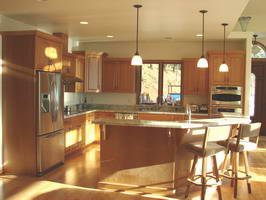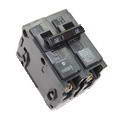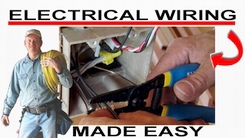Electric Circuit Repair after Flood or Water Damage
 '; ';
|
What should I do about Water Damaged Electrical Wires? Basic Procedure for Water Damaged Electrical Systems, Electrical Repairs for Water Damaged Electrical Wiring and Parts. © By: Dave Rongey |
Basement Water Causes Electric Circuit Problem
Electrical Question: What should I do about water damaged electrical wires?
I had a couple of inches of water in my basement and following the draining of the water I have an electrical circuit that does not work. None of the circuit breakers are tripped and I have tested and reset all the GFCI outlets.
The end of the circuit has lights and outlets that are not getting power but I can’t trace the wires back to the breaker box due to the covering of the drywall.
I had an extension cord plugged into the outlet with the female end laying on the ground when the water flooded and was covering it. No power now reaching that outlet or others connected to it but no tripped breaker. Should I replace the breaker even though it isn’t tripped and seems to flip on and off without any binding?
Is there any other areas I can look to?
This electrical wiring question came from Paul in Michigan.
Dave’s Reply:
Thanks for your electrical wiring question Paul.
Paul, the circuit breaker should be tested to see if it really needs to be replaced. Keep in mind that there may be other damage within the electrical system in the basement that were affected by the water damage. Please continue reading for further information.
Electrical Repairs After Water Damage
- Application: Inspecting and Repairing Water Damaged Electrical Systems.
- Skill Level: Intermediate to Advanced – This is Best performed by a Qualified Electrician or Water Damage Professional.
- Tools Required: Basic Electricians Pouch Hand Tools, Voltage Tester, Continuity Tester and Megger Meter.
- Estimated Time: Depends on the complexity of the water damaged electrical circuits and equipment.
- Precaution: Identify the electrical circuits which provide power to the water damaged area and equipment, turn the circuits OFF and then Tag it with a Note before performing any electrical inspections, tests or repair of electrical wiring.
- Note: Water damaged equipment is best repaired by a Licensed Electrical Contractor or a Certified Trained Water Damage Technician.
- Basic Procedure for Water Damaged Electrical Systems
Water damage can cause a variety of problems not only to the building structure and the furnishings, but also to the electrical wiring system, components and equipment. The electrical circuits should be turned OFF until the water damaged area has been properly evaluated and the necessary repairs have been made. GFCI circuit protection should always be used in the affected area even during the cleanup process where electrical devices and equipment will be used.
- Electrical Repairs for Water Damaged Electrical Wiring and Parts
The affected electrical systems of the water damaged area should be thoroughly inspected. Because of the corrosive damage that can occur, water saturated cable or wiring and electrical components such as outlets and switches should be replaced. If motors or other electrical equipment has become immersed into water or has an accumulation of moisture it would be best to obtain a water corrosion inhibitor that is approved for electrical equipment. Follow the instructions completely which typically suggests to apply the water and corrosion inhibitor before drying the equipment or exposing the equipment to the air. Exposing water damaged equipment to the air without treating it with an approved electrically safe corrosion inhibitor may cause permanent damage.
See More about Home Electrical Wiring Systems
Wiring Electrical Outlets for the Home
Home electrical wiring includes 110 volt outlets and 220 volt outlets and receptacles which are common place in every home. See how wiring electrical outlets for the home are done.
Home Electrical Circuit Wiring
Electrical Circuit Wiring
This article looks at common 120 volt and 240 volt house wiring circuits and the circuit breakers that are installed identifying the types and amperage sizes used in most homes.
Home Electrical Circuit Breakers
Home Electrical Circuit Breakers
A guide to home electrical circuit breakers and how they work to protect your electrical wiring. When properly installed, your home electrical wiring is protected by a circuit protection device.
GFCI and GFI Wiring Diagrams
The features and benefits of GFCI outlets and receptacles will give you a clear understanding of the importance why these safety devices are required by code to help protect you and your family against accidental electrical shock hazards.
GFCI Wiring
This list of articles will help you learn about the features and benefits provided by GFI and GFCI Receptacles and how they are wired.
How to Install Basement Electrical Wiring
Basement Electrical Wiring
Fully Explained Photos and Wiring Diagrams for Basement Electrical Wiring with Code Requirements for most new or remodel projects.
Testers Help Determine Conditions that Lead to Electrical Power Loss
Troubleshooting to Find Out Why Your Home Lost Power
How to Identify Lost Power
Licensed Electrician Reveals the Secrets of Successful Electrical Troubleshooting Methods used to solve the majority of the home electrical problems and wiring failures encountered.
The following may also be helpful for you:
Be Careful and Be Safe - Never Work on Energized Circuits!
Consult your Local Building Department about Permits and Inspections for all Electric Wiring Projects.
More articles about Electrical Repair and Home Electrical Wiring: |
|
| « Previous | Next » |
How I Install Circuit Breakers in Electrical Service Panels |
How to Wire a JVR Digital Time Switch |

















Hi Stacie,
Typically, unless the electrical wiring has been completely submerged in water and the structure framing does not have to be replaced then the wiring does not need to be replaced. In cases like this your Homeowners Insurance company will have a contractor come out to review the extent of the water damage and prepare the cleanup, and repair any damage that may have occurred to the wall coverings, such as sheet rock, remove and replace insulation and basically expose all of the water soaked areas to air so it will completely dry out to prevent mold or mildew, which can damage the home, and would not be good for your health. Keep in mind that each situation such as this will need to be inspected by a Certified Water Damage expert to completely assess the damage and make the appropriate repairs.
I hope this helps you.
I had a leak from my bathroom which came through the ceiling into my hallway and living room and down into the cellar on Sunday morning, the water was coming through my spotlights on the ceiling and running down the wall over the light switches. will we need the lights etc rewired?
Hi Aleta,
In most cases, the circuit should be turned off so the wiring can be exposed at the affected outlet boxes and allowed to dry before reusing. However if a GFCI outlet has been saturated with water it may need to be replaced.
I hope this helps you,
Dave
Somehow my kitchen coffee maker leaked all the water I put in, about 1/2 gallon onto the kitchen counter. The leak definitely came from the bottom of the coffee maker itself and began when I poured water in to make coffee. Water spilled everywhere on kitchen counters. After I cleaned it up I got a new coffee maker and discovered that the kitchen outlets that flank my sink and which I have used for coffee maker, grinder and microwave do not work. The oven and refrigerator circuits do work, as do outlets on the other side of the kitchen and kitchen overhead lights. No circuit breakers have tripped. Can I hope that the wiring will dry out on its own in a few days and that will allow the outlets to work or do I need to call an electrician? I really dread expense of electrician.
Hello author, thank you so much for sharing this post with us. Some of the people do not understand what to do after flood damage and especially when it come to repair the electricity. After reading this post, they can get to know about what they can do at such situations.
Hi Kristi,
This has all the ingredients of a serious problem with potential electric shock hazards, possible mold or mildew problems, and structural damage as well.
Here is what I would do in a situation such as this:
Document this issue in written form in full detail, date it, and keep the original copy. Send or deliver a copy of this document to the landlord and if possible the property owner. Request that the matter be resolved. Explain that this is not the first occurrence and that previous repairs did not resolve the problem. Contact the local building authority or building department and explain the situation with this rental unit and provide a copy of the document that was submitted to the landlord. Ask about the correct procedure to have the matter resolved and what the allowed time frames are. Ask about what your tenant rights are and how you may be assisted in this matter. Electric circuits that are affected should be identified, labeled, and turned OFF to prevent the possibility of electric shock hazards. It would be best to have the matter resolved right away. Relocating into a different rental unit until these problems are resolved should be seriously considered for your safety.
I hope this helps.
Dave
I had a water leak from my bathroom upstairs through my kitchen ceiling last night. This is not the first time, and obviously the house has had a history of leak problems. The water leaked down the walls behind the stove and outlets in the kitchen, and out of the ceiling directly above and onto the stove.
In addition, there is evidence of water leakage down through the walls into the bottom cabinets (I just recently found this). We have had problems in the house with electrical shorts, outlets arcing, the water heater tripping its circuit, and the dryer occasionally giving off a small shock. Now I am worried that we could have a significant water and electrical issue. My landlord had the leak fixed last time, but not well.
Advice?